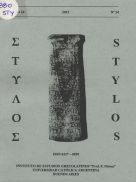Please use this identifier to cite or link to this item:
https://repositorio.uca.edu.ar/handle/123456789/4278| Título: | Acerca de Génesis 2,23 : la traducción de 'Ishah al griego, al latín y al castellano | Autor: | Hack de Smith, Viviana | Palabras clave: | TRADUCCION; Biblia. A.T. Génesis; GRIEGO; LATIN; LENGUAS MODERNAS; CASTELLANO | Fecha de publicación: | 2015 | Editorial: | Universidad Católica Argentina. Facultad de Filosofía y Letras. Instituto de estudios grecolatinos "Prof. F. Nóvoa" | Cita: | Hack de Smith, Viviana. “Acerca de Génesis 2,23 : la traducción de 'Ishah al girego, al latín y al castellano” [en línea]. Stylos, 24 (2015). Disponible en: https://repositorio.uca.edu.ar/handle/123456789/4278 | Resumen: | Resumen: Luego del relato de la creación del mundo en el primer capítulo del Génesis (Gn 1,1-31), la descripción particular y ampliada de la creación del ser humano se detiene en una consideración etimológica sobre la relación del femenino ´ishah (mujer) con el lexema ´ish (varón). La lectura de una línea interpretativa atestiguada en los primeros siglos da a entender que Génesis 2,23 traza un paralelismo conceptual y metafórico entre la derivación lingüística del sustantivo femenino a partir del mismo lexema que el masculino y el relato de la creación de la mujer a partir de la costilla del propio cuerpo del hombre. Las traducciones de este versículo al griego, al latín y a las lenguas modernas reflejan distintos marcos de comprensión del texto original, en los cuales la aceptación de la derivación léxica o su refutación han generado interpretaciones y exégesis diversas. En el presente trabajo se analiza la lectura de este versículo en la Versión de los Setenta, la Vulgata Latina y versiones españolas a partir de la Biblia Alfonsina hasta nuestros días. Abstract: After the creation of the world is related in the first chapter of Genesis, the particular and widened description of the creation of the human being comes to a stop before an etymological consideration of the connection between the feminine ishah (woman) and the lexeme ish (man). Thus, Genesis 2, 23 traces a conceptual and metaphorical parallel between linguistic derivation of the feminine noun from the masculine lexeme and the relation of the creation of woman from a rib taken from the body of the man. Translations of this verse into Greek, Latin and modern languages reflect different ways of understanding the original text, and have resulted in various interpretations along the centuries. Our work analyses the reading of this verse in the Septuagint, Latin Vulgate and Spanish versions from the Alphonsine Bible to the present. |
URI: | https://repositorio.uca.edu.ar/handle/123456789/4278 | ISSN: | 0327-8859 | Disciplina: | LITERATURA | Derechos: | Acceso Abierto | Fuente: | Stylos, 24, 2015 |
| Appears in Collections: | STY - 2015 nro. 24 |
Files in This Item:
| File | Description | Size | Format | |
|---|---|---|---|---|
| acerca-genesis-traduccion-ishah-griego.pdf | 264,3 kB | Adobe PDF |  View/Open |
Page view(s)
823
checked on Apr 30, 2024
Download(s)
13,595
checked on Apr 30, 2024
Google ScholarTM
Check
This item is licensed under a Creative Commons License

